Why is it so difficult to deal with smartphone addiction?
In November, I watched The Social Dilemma on Netflix. It struck a rather terrifying chord and as a result, I turned off all my notifications. Last week I broke, turned them all back on and to my surprise I felt a lot of relief. I didn’t have to remember to check the plethora of platforms we are, for better or worse, now shackled to.
Websites and apps have made themselves indispensable in the modern world, from promoting events to keeping in touch with family. It is easy to see how so many of us find ourselves addicted.
‘The Guardian’ reported that 40% of university students have a smartphone addiction. 40% of us are considered to have a need, a craving for our phones. How much time you spend on your phone is a good indicator of this, more time put in means more time you want to put in. Overuse of smartphones can then have negative effects on our sleeping, stress, anxiety, mood, self-esteem and a whole host of other issues.
These companies exploit the brain’s need for connection and social inclusion
When we look at the addict in terms of social media, often the true perpetrators are looked over in favour of blaming the consumer. With Machiavellian precision, social media companies have made themselves irreplaceable and depended upon.
Attention-harvesting, companies will do whatever they need to get the user back, as most service providers do. In most cases it is feeding us what we want to see, gradually growing more extreme it takes more to draw us back. It is one of the reasons that political extremism has taken a popular turn as the user is generally less exposed to more central views.
These companies exploit the brain’s need for connection and social inclusion as we want to and do, keep coming back. There is little effective regulation surrounding the field as diplomatically navigating this new moral minefield simply cannot keep in line with the rapid growth of the industry. So, there is virtually nothing to stop them from doing whatever they please in terms of creating all too appealing spaces and encouraging addiction.
The basis of social media is external validation
This leads us to ask if the detrimental effect is in the nature of these platforms, or merely a useful tool warped into something it’s not. Ultimately, I think the destructive tendencies displayed are not simply bugs needing to be ironed out, but the inherent features that we have grown to rely on.
The basis of social media is external validation. It is social media, but this is part of what brings so much harm to the user. We don’t get the benefits of constant communication with the world without the harm.
I’m not saying there isn’t an abundance of benefits to accompany the platforms, because there is. They help us educate, inform and communicate. Social media can also be extremely comforting. Lockdown has inevitably led to its own loneliness epidemic and there is no doubt social media has helped ease the burden.
Don’t go on your phone too much before you go to sleep
Now I would usually say something along the lines of there can be too much of a good thing, but I don’t think that’s what we’re facing here. It is a much more complex amalgamation of somewhat good intentions of a more connected world being achieved through nefarious methods, of constantly reassuring us of the benefits yet failing to warn us about the perhaps unintended side effects, of preaching self-love yet encouraging self-loathing.
It seems, however, social media is staying put and unregulated for now and so it lies to us to try and be better addicts and so I have a few tips. Don’t go on your phone too much before you go to sleep. Maybe read a book or listen to some music or get one of your friends to read out tweets in a dramatic manner to you.
Be wary of what information you’re being given, perhaps follow a few accounts that hold views different from your own, and go and spend an hour or so glued to The Social Dilemma instead. It will probably scare you into turning your notifications off for a few months too.

Comments